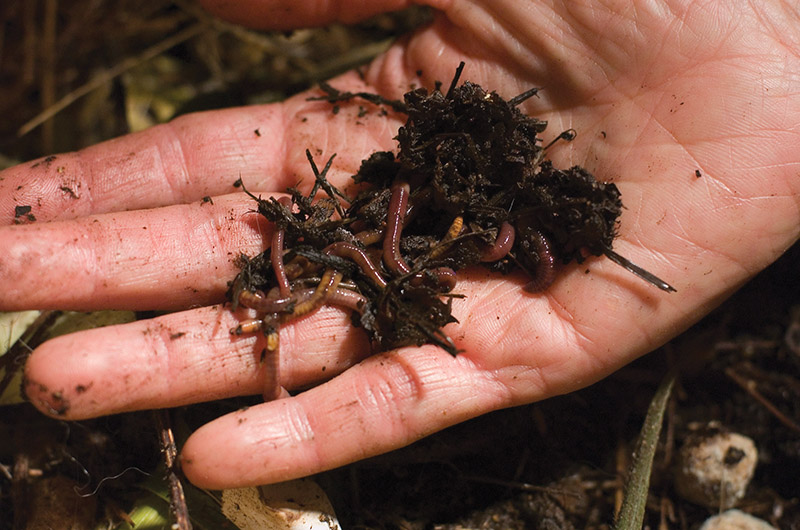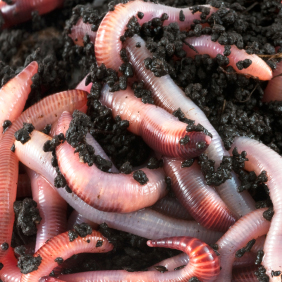Eco-friendly red wigglers: For organic gardening
Eco-friendly red wigglers: For organic gardening
Blog Article
Exactly How Red Wigglers Can Reinvent Your Home Composting System
The assimilation of red wigglers into home composting systems offers a standard shift in waste monitoring and soil improvement. These worms, known for their efficiency in damaging down organic materials, not only speed up decomposition however additionally enhance the resulting compost with crucial nutrients. Their ability to consume substantial amounts of organic waste daily can significantly decrease the quantity of house refuse. As we discover the technicians of incorporating these amazing organisms into your composting routine, the implications for both individual horticulture and broader ecological sustainability ended up being increasingly compelling. What strategies can effectively harness their possibility?

Understanding Red Wigglers
(buy red wiggler worms)
Comprehending the role of red wigglers in composting is important for making best use of the benefits of this environmentally friendly practice. Red wigglers, scientifically known as Eisenia fetida, are a types of earthworm especially favored for vermicomposting due to their impressive capability to procedure organic waste effectively. These worms grow in disintegrating natural issue, actively taking in kitchen area scraps, backyard waste, and various other eco-friendly materials.
Distinct from other earthworm types, red wigglers prefer a wet, abundant setting, which makes them optimal for compost containers. They recreate quickly, doubling their population in an issue of weeks under optimal conditions. This respected breeding adds to the acceleration of the composting process, improving the malfunction of natural product into nutrient-rich vermicompost.
In addition, red wigglers can eat as much as half their body weight in raw material daily, properly lowering waste quantity and accelerating decomposition. Their digestion process not only changes waste right into useful garden compost however likewise adds beneficial microbes, additionally enriching the resulting item. Comprehending these characteristics of red wigglers is critical for any individual wanting to execute an effective home composting system, making sure a lasting technique to lose management.
Benefits of Vermicomposting
Vermicomposting supplies a multitude of advantages that make it an eye-catching alternative for home gardeners and environmentally aware people. Among the most substantial advantages is its capacity to efficiently convert kitchen area scraps and organic waste into nutrient-rich compost, enhancing soil health and wellness and promoting plant growth. The resulting vermicompost is abundant in essential nutrients, including nitrogen, phosphorus, and potassium, which are essential for durable plant growth.
Furthermore, vermicomposting substantially decreases house waste, drawing away natural products from landfills and reducing methane exhausts, a powerful greenhouse gas. This procedure not just reduces waste management challenges but also supports sustainability efforts.
Moreover, the presence of red wigglers in the composting procedure accelerates decay, causing quicker production of garden compost contrasted to conventional methods. red wigglers. This fast change implies gardeners can enjoy a steady supply of top quality compost throughout the year
Furthermore, vermicomposting fosters an interesting and academic experience for households, educating kids about ecological stewardship and the significance of reusing natural products. Altogether, the advantages of vermicomposting prolong beyond mere garden compost manufacturing, adding to much healthier yards and a more sustainable lifestyle.

Establishing Up Your Worm Bin
Creating a worm bin is a simple procedure that can considerably improve your composting efforts. To begin, choose an appropriate container, which can range from a plastic bin to a wood box. Make certain that the container has adequate ventilation by piercing tiny holes in the lid and sides. This will certainly allow for air movement, important for the wellness of your red wigglers.
(red wigglers for sale near me)
Next, prepare the bed linen product, which works as an environment for the worms. A mixture of shredded paper, cardboard, and coconut coir is perfect, as it maintains dampness and offers a comfortable setting. Go for a bed linens depth of about 6 inches.
As soon as the bedding remains in location, moisten it lightly to develop a damp however not wet atmosphere. After that, introduce your red wigglers, generally around one extra pound for a conventional bin. The worms will adjust to their brand-new home and begin processing organic waste.
Preserving a Healthy Worm Ecological Community
To maintain your red wigglers thriving, it's crucial to keep track of and maintain a balanced environment within your worm bin. This involves meticulously taking care i was reading this of wetness degrees, which should be preserved at around 70-80%. As well much dampness can result in anaerobic conditions, while insufficient moisture can create the worms to dry out.
In addition, supplying ample aeration is important. Routinely turning the compost aids to present oxygen, which supports the worms' wellness and advertises effective decomposition. It's also essential to keep a suitable temperature range, preferably in between 55 ° F and 77 ° F. Extreme temperatures can stress and even eliminate the worms.
Feeding your red wigglers a well balanced diet regimen promotes their well-being. They grow on a variety of natural materials, consisting of vegetable scraps, coffee premises, and shredded paper. Avoid including citrus peels, meat, or dairy products, as these can interfere with the community and draw in parasites.
Finally, keeping track of the pH level is essential. Red wigglers like a slightly acidic to neutral pH (around 6.0 to 7.0) Consistently inspecting these specifications will certainly aid guarantee a healthy atmosphere for your worms, eventually bring about an effective composting system.
Harvesting and Utilizing Worm Spreadings
Harvesting worm spreadings is a rewarding procedure that enriches your garden and enhances dirt health and wellness. Worm spreadings, additionally called vermicompost, are nutrient-rich natural fertilizers created by red wigglers throughout the composting procedure. To collect, permit the worms to damage down the natural matter for numerous months, making certain that the product is dark, brittle, and has an earthy odor.
There are numerous methods to collect castings. One usual strategy is the "migration" technique, where you push the ended up garden compost away of the bin and add fresh bedding and food to the other side. The worms will move to the brand-new food resource, enabling you to easily collect the spreadings from the initial side. Conversely, you can make use of a screen or filter to divide the worms from the spreadings, although this approach may be a lot more labor-intensive.
Once harvested, worm castings can be used straight to garden beds, made use of as a soil modification, or made into a nutrient-rich liquid plant food. Incorporating worm spreadings right into your horticulture regimen not only increases plant growth but likewise improves dirt structure and microbial task, making it an essential element for sustainable gardening methods.
Final Thought
In verdict, red wigglers stand for a transformative remedy for home composting systems. Their capability to effectively refine organic waste right into nutrient-rich compost not just lowers home waste however also improves dirt health and advertises sustainable gardening practices. By cultivating a thriving ecological community through vermicomposting, individuals can add to ecological sustainability while taking advantage of enhanced soil top quality. The assimilation of red wigglers into composting techniques offers a useful strategy to lose monitoring and environmental stewardship.
Report this page